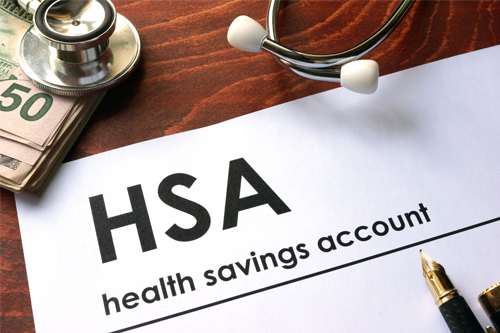Open Enrollment is coming up – Here’s what you need to know about HSA’s (Health Savings Account)
Medical expenses can add up quickly … contact lenses, braces, prescription medicines, supplies for chronic disease care. That’s not accounting for the unforeseen. The broken arm that sends your kiddo to the ER or the emergency appendectomy. Whether you’re planning for known or unknown medical expenses, health savings account that helps cover those costs can be a financial life-saver.
What is a Health Savings Account (HSA)?
An HSA combines high deductible health insurance with a tax-favored savings account. Money in the savings account can help pay for medical deductibles you might have. Once the given deductible is met, the insurance starts pay. The money left in the savings account earns interest and is yours to keep.
It’s important to note that unlike health reimbursement arrangements (HRA’s) and health flexible spending accounts (FSA’s), HSA’s must be paired with high-deductible health plans (HDHP’s).
You may use your HSA to pay for (or reimburse yourself for) the qualified medical expenses of yourself, spouses’ and dependents’ qualifying medical expenses.
What are the advantages of an HSA?
There are a few benefits to an HSA such as cost savings, long-term financial benefits and choice based upon your decision. Here are a few more detailed advantages of an HSA:
- Triple tax benefits
- HSA contributions are excluded from federal income tax
- Interest earnings are tax-deferred
- Withdrawals for eligible expenses are exempt from federal income tax
- Reduction in medical plan contribution
- Unused money is held in an interest-bearing savings or investment account
- Save for future medical expenses
- Fund roll over from year to year
- Account is portable – you take it with you even if you leave the company
- It’s yours! You control and manage your health care expenses and when to use the dollars to pay for your health care expenses
When do I use my HSA?
After visiting a physician, facility or pharmacy, your medical claim will be submitted to your HDHP for payment. Your HSA dollars can be used to pay your out-of-pocket expenses billed by your physician, facility or pharmacy, or you can choose to save your HSA dollars for a future medical expense.
A very important note about an HSA is you may use your HSA for non-medical expenses. However, HSA amounts that are used for non-medical expenses are taxable as income to you and are generally subject to an additional 20% penalty.
How do I manage my HSA?
Your HSA is your account, so the money is yours to manage. You may choose when to use your HSA dollars or when not to use your HSA dollars.
What expenses are NOT eligible for reimbursement from my HSA?
The following expenses may not be reimbursed from an HSA:
- Premiums for Medicare supplemental policies
- Expenses covered by another insurance plan
- Expenses incurred prior to the date the HSA was established
- Over-the-counter drugs purchased without a prescription, except insulin
When do I contribute to my HSA account, and how often can I?
You, your employer or others can contribute to your HSA account through payroll deductions or as a lump sum deposit.* You can contribute as often as you like, provided your and your employer’s total annual contributions do not exceed $3,450 for single coverage or $6,900 for family coverage for 2018. For 2019, the maximum is $3,500 for single coverage and $7,000 for family coverage. Individuals who are age 55 or older are eligible to make “catch-up” contributions up to $1,000.
* May vary depending on HSA plan design and benefit plan design. Refer to your HR administrator for specifics pertaining to your plan.
What happens to my HSA dollars if I leave my employer?
The funds are yours to keep. You may elect one of the following options:
- Leave your funds in the current HSA account
- Transfer your funds to an HSA with your new employer
- Transfer your funds to another qualifying account within 60 days
Can I use the money in my account to pay for my dependents’ medical expenses?
You can use the money in the account to pay for the medical expenses of yourself, your spouse or your dependent children. You can pay for expenses of your spouse and dependent children even if they are not covered by your HDHP.
After all of this helpful information, you might be wondering how to best maximize your HSA. Here are five helpful tips to help get the most out of your health savings account.
- Contribute as much as you can.
- HSA’s are designed to offer triple tax benefits – meaning you put your money in tax-free, it gains interest tax-free and you can withdraw it tax-free for qualified medical expenses.
- Use over-the-counter (OTC) drugs if at all feasible.
- If you regularly take a certain OTC drug, consider asking your doctor for a prescription so you can purchase the medication using your tax-free HSA funds.
- Only visit the emergency room in an emergency situation and understand your network.
- Remember that your doctor’s office and the urgent care center are more appropriate places to treat conditions that are not life-threatening – and they are more cost-effective.
- It’s also important to know who your in-network providers are, since out-of-network care will typically result in higher out-of-pocket costs.
- Beware of possible medical billing errors.
- Taking the time to review your charges can help save you money.
- Stay healthy!
- Regular exercise, a healthy diet and abstaining from tobacco can help you avoid health issues in the first place.


